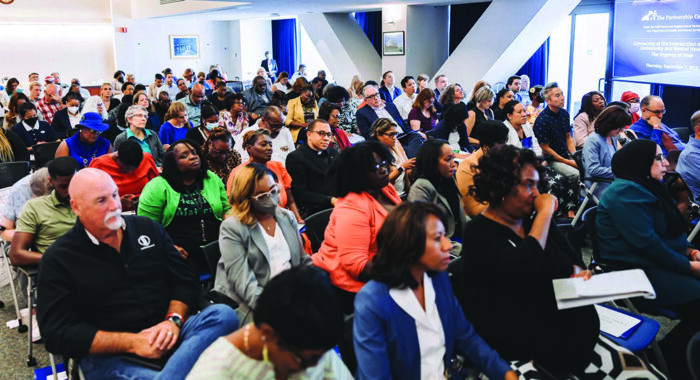
Did you know the NAE has a robust chaplaincy program that brings the love of Christ to places where churches can’t go? In battlefields, hospitals, prisons, boardrooms and police departments, chaplains are visible reminders of God. Chaplains are at the forefront of gospel proclamation — literally on “the front lines.”
Representing more than 3,000 chaplains nationwide, the NAE Chaplaincy provides a “home” for chaplains of different backgrounds and traditions, and supports chaplains through ministerial endorsement, training workshops, individualized support and networking with other chaplains.
Since its founding in 1944, the NAE Chaplaincy has operated in two arenas — first, by providing direct endorsement of and support for chaplains, and second, by bringing together different denominational chaplaincy ministries to form the Evangelical Chaplains Commission, the largest representative body of chaplains in the U.S. Armed Forces and Veterans Administration. And now, we can expand the NAE Chaplaincy ministry to meet a vital need.
Some chaplaincy roles like military service only require endorsement (i.e., official validation from a religious body that the chaplain is committed to their faith and has met the educational qualifications to serve as a chaplain). However, institutional chaplaincy, such as in health care settings, requires that chaplains be board certified in addition to their endorsement. This certification is governed by professional agencies that determine clinical standards for institutional chaplaincy. These agencies provide leverage for the chaplain to negotiate various issues that may arise with his/her employer. The agencies are also expected to advocate on behalf of the chaplain when necessary.
Some evangelical chaplains are encountering resistance from their employers when they seek a full expression of their faith. Although 60-65 percent of all chaplains in the United States come from evangelical backgrounds, until now there has not been a certification agency that is dedicated solely to evangelical commitments. In fact, it has been observed that a substantial portion of the industry has been gradually developing a less receptive attitude towards the evangelical faith.
Furthermore, recent trends indicate a growing emphasis on a generalized approach to healthcare chaplaincy. Thus, overshadowing the traditional faith-based aspects of spiritual care. Consequently, this subtle shift potentially lessens the unique impact of evangelical beliefs within ministry.
Regrettably, these chaplains are often faced with a difficult decision between adhering strictly to their professional restrictions and fulfilling their spiritual calling. They may either withhold providing spiritual care they hold as dear or face the risk of losing their jobs — a circumstance that will negatively affect their professional paths. Ultimately, chaplains should not be compelled to choose between the clinical and spiritual dimensions of their work.
In response, the NAE has established a new board certification agency to step in the gap. The Evangelical Board of Certified Chaplains (EBCC) will operate as a third division of NAE Chaplaincy, alongside chaplain endorsement and the Evangelical Chaplains Commission.
What started out as a dream just a few years ago is now becoming reality! Here are a few highlights of the progress so far:
- A strategic advisory committee was established to review the existing landscape of institutional chaplaincy and recommend actions that would position the EBCC for success;
- Dr. Juliana Lesher, previously the national director of chaplain service for the Department of Veteran Affairs, joined the effort as a consultant to lay the groundwork for the EBCC and now serves as the director of the EBCC; and
- The NAE Board of Directors formally and enthusiastically adopted the new chaplaincy charter on March 7.
We look forward to sharing more in the future about what God will do through chaplains who are empowered to serve those most in need of gospel hope and transformation.
Apply for Board Certification through the EBCC



 View All Articles
View All Articles 











